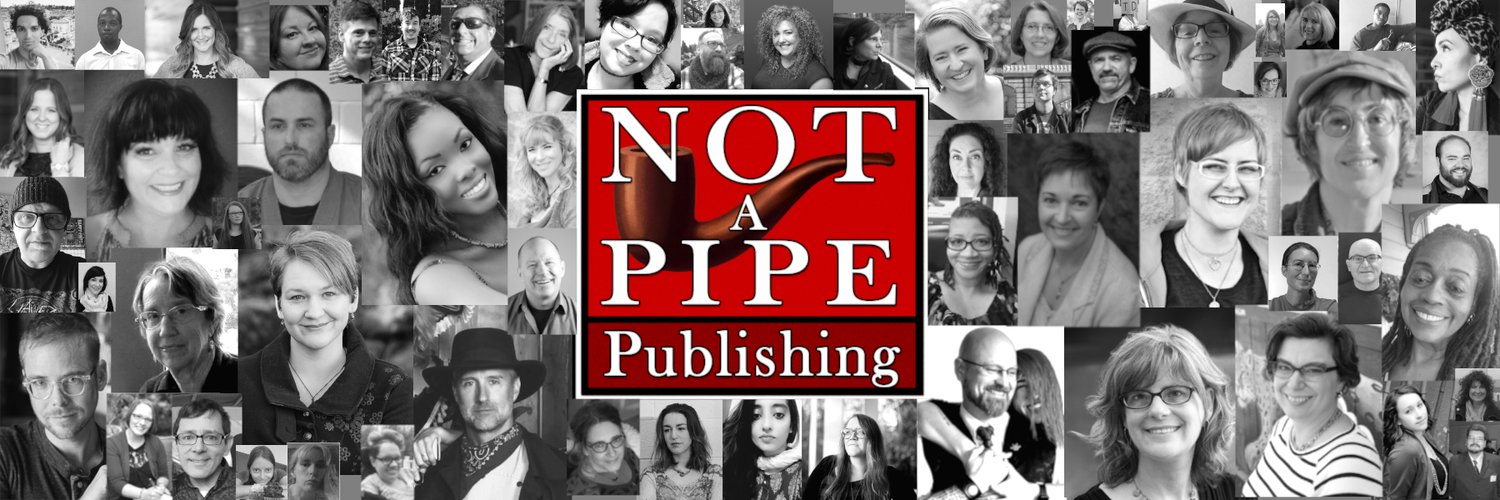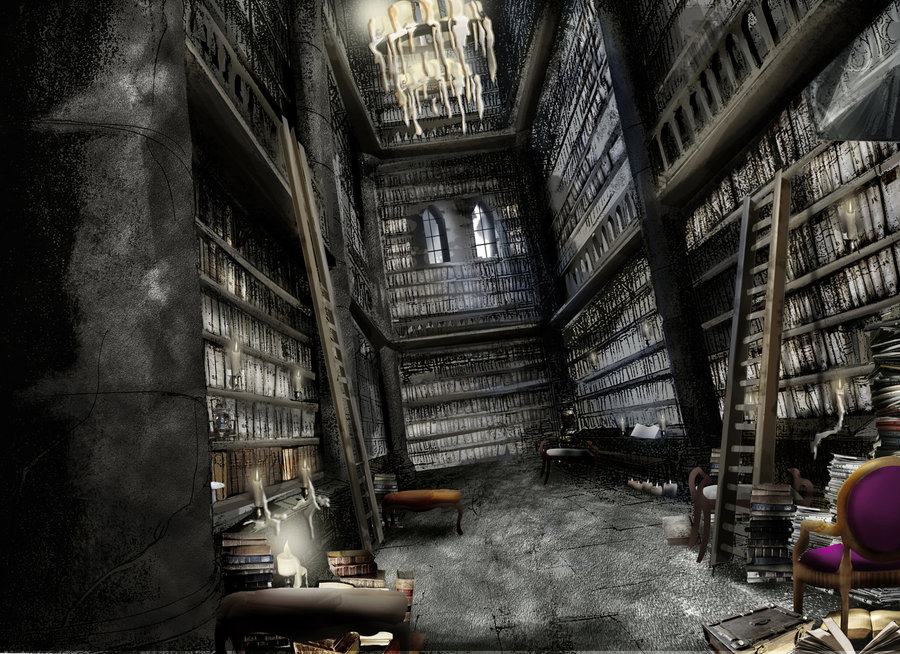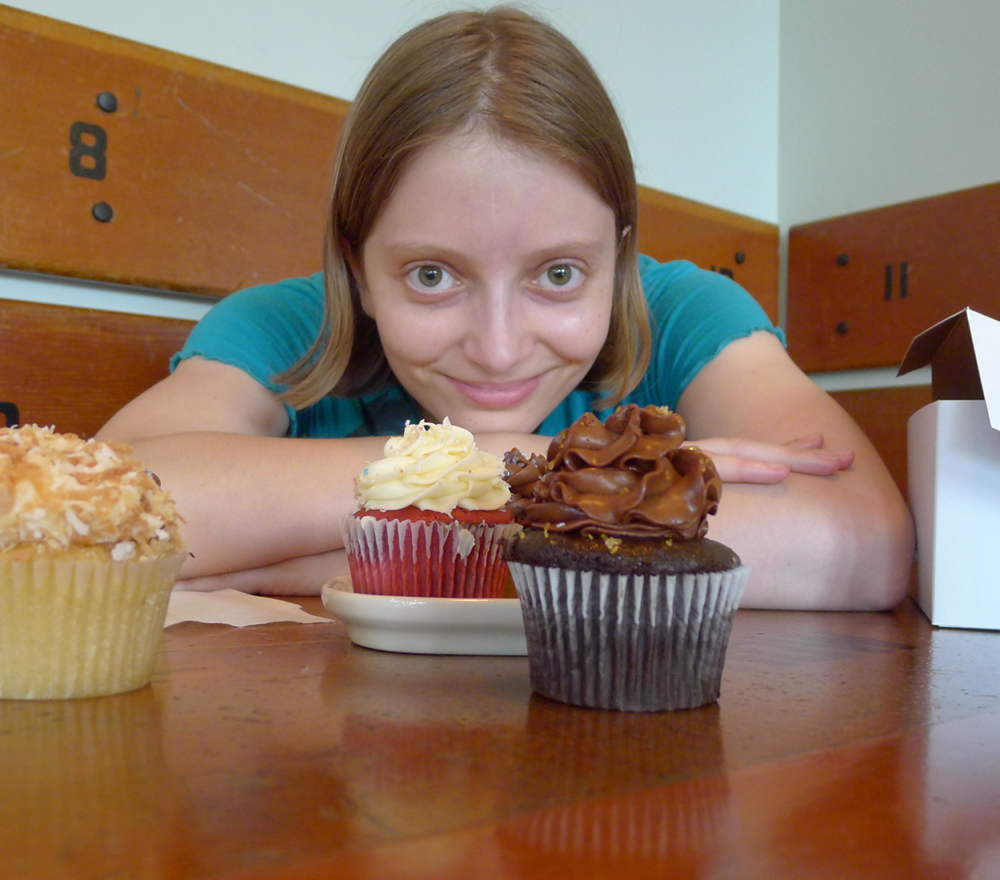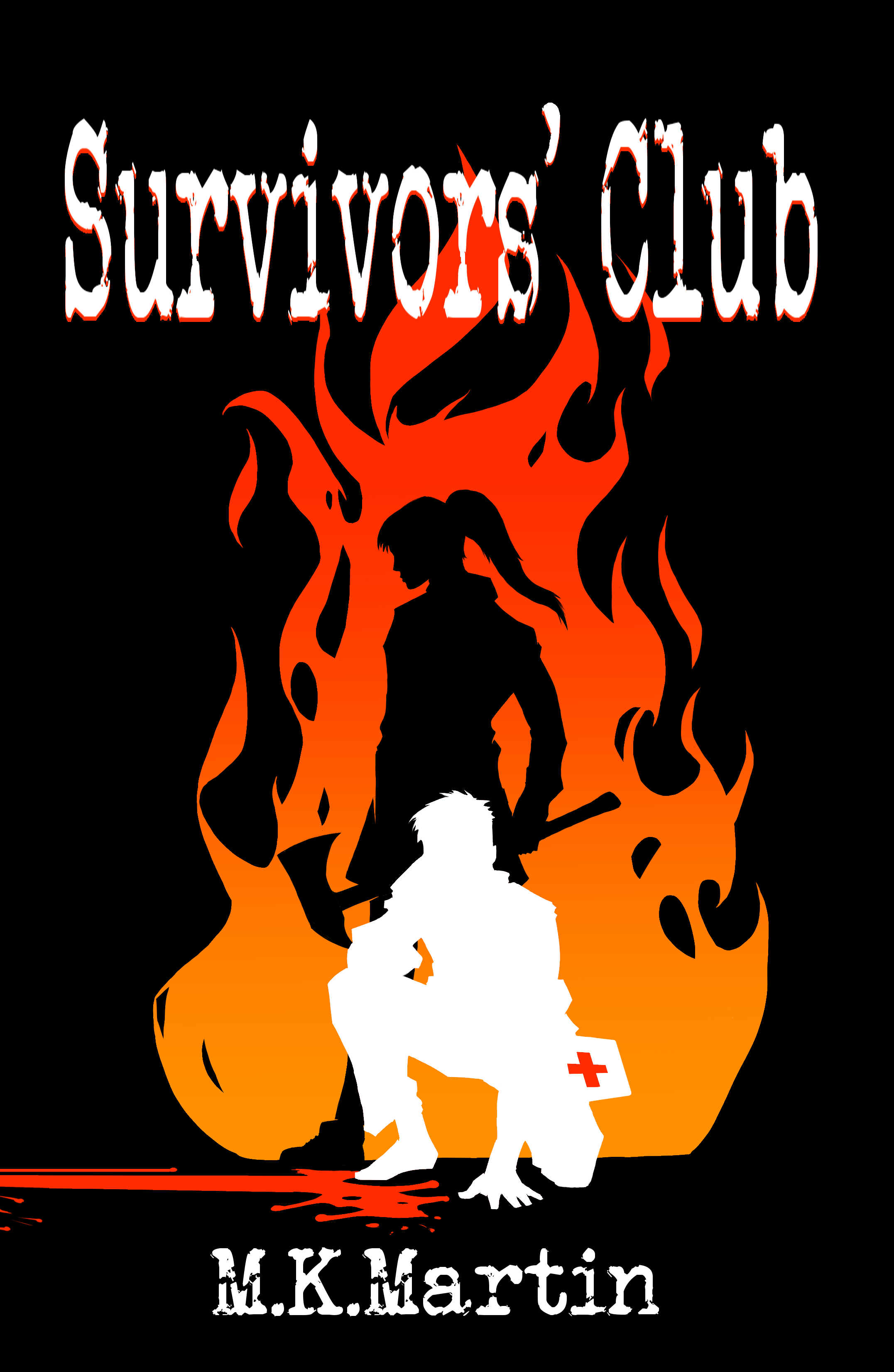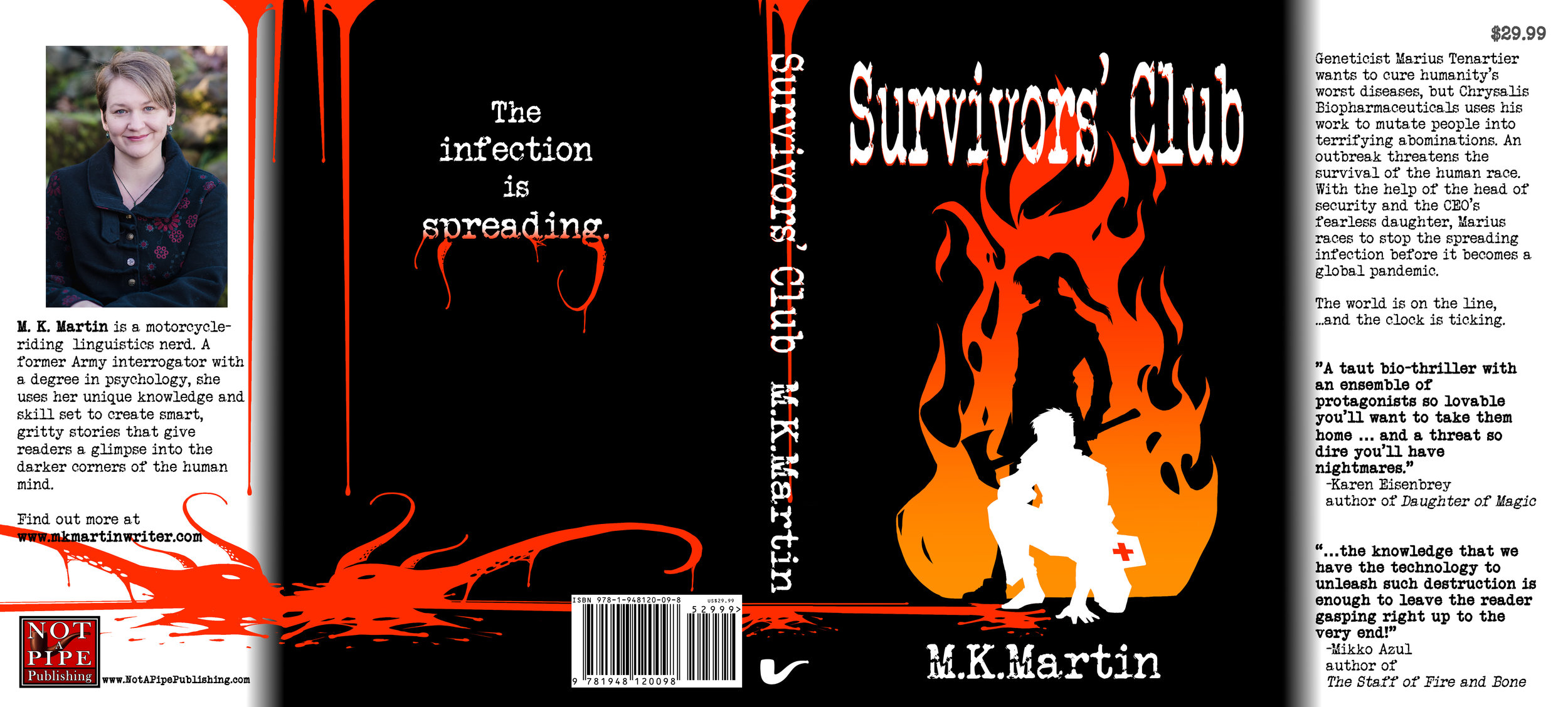During 2018, Not a Pipe Publishing has accepted Kamila Shamsie's challenge to only publish women for one year. Beyond the nine (nine!) novels we'll be publishing, we'd also like to promote even more women's voices, so we'll be publishing short fiction here. If you would like to submit, check out the information HERE. Selections for the anthology will be made in September, so get your story in now!
"Maiden Voyage of the Fearless" will take you on a voyage of emotions. I felt saddened and inspired and terrified in the brief span of the story. With a fittingly clinical narrative voice, Griggs' story introduces a lot of big concepts, such as the challenges of living with mental illness, the unknowable landscape of the brain, and the risks we take for quality of life. I know this is a story that will have a lasting effect on me, and I believe it will affect others just as deeply. -Sydney Culpepper, Assistant Submissions Editor
Maiden Voyage of the Fearless
Claudine Griggs
“Bite down hard,” said the nurse.
Antoinette felt almost insulted. “I’ve done this before,” she said, neither worried nor happy about the procedure. Despite her severe anxiety disorder, which was why she was here, the treatments were routine, and Antoinette liked routine. The nurse spread conductive gel on Antoinette’s temples. The doctor positioned the electrode paddles. “Ready,” he said, more out of habit than necessity, and stepped on the foot pedal to administer electroshock therapy to his patient.
Because the treatments were moderately helpful, Antoinette Rodriguez and her parents requested they be administered twice per year in addition to the usual medications for stress and depression. At age 34, Antoinette still lived with her parents, typically left her bedroom only for specially prepared meals, and almost never ventured outside the Rodriguez residence except to the hospital for biannual “electroconvulsive therapy.”
ECT was rarely used because many medical practitioners considered it barbaric. The procedure certainly looked barbaric with its purposefully induced seizures by shooting electricity into the brain while restraining the patient on a table. The nurses, especially young women new to the profession, typically found it more distasteful than the doctors, but everyone who had worked with Antoinette during two decades of psychiatric care agreed. She needed these treatments. Pharmaceuticals, hypnosis, and counseling could do only so much, and even with enhanced anxiety medications, Antoinette was a curious case: acute agoraphobia compounded by depression, obsessive compulsive disorder, and other issues that could not be precisely labeled. Off the record, people said, “The woman’s terrified of everything.” Antoinette even worried about the day when her loving parents might abandon her, or die, or murder her and stuff the body into an industrial meat grinder to dispose of the evidence.
Antoinette understood that there were no rational bases for most of her fears, but by age 14 she had begun to have severe social difficulties. Too many people on campus. Too many at the shopping mall. Too many strangers. In fifth-period history class at Brookline High, Massachusetts, she started answering questions that had not been asked, and the teacher informed her parents. By age 15, with so many people “thinking bad thoughts,” with so much danger everywhere, Antoinette refused to leave her bedroom.
To the relief of school authorities, the doctor transferred her to a psychiatric hospital in Belmont where she screamed hysterically about people trying to kill her, and then she cowered in a corner whenever left alone. Too many lab coats. Too much stimulation. Too much terror.
After four months of observation, medications, and electroconvulsive therapy, a psychiatric panel agreed that Antoinette Rodriguez was permanently disabled by mental illness. She would probably never be able to work, buy groceries, establish social relationships, or care for herself. She even had difficulty sleeping because dreams frightened her (insomnia added to the neurological troubles) and resisted exercise because the strain might induce a heart attack. Antoinette wondered whether even her shadow, which occasionally tried to console her, might turn malicious. A strong anti-anxiety and anti-depressant compound helped, but despite knowledgeable and compassionate doctors, Antoinette pleaded for the security of her own room.
“Like chicken soup,” said Dr. William Crawford to her parents, “homecare couldn’t hurt. And it might even help as we try different therapies.”
So Antoinette returned to her familiar bedroom with a prescription, regular nursing visits, and bi-annual electroshock therapy. ECT worked better than anything else at temporarily calming the patient—enough, at least, so that Antoinette could function with in-house supervision of her parents. The insurance company supported the plan, as well, because it cost significantly less than inpatient hospital care.
Mr. and Mrs. Rodriguez worried what might happen to Antoinette should one or both of them die. They languished over grandchildren that would never be. They prayed that Antoinette would get better but, especially, not get worse. And the deeply religious Rodriguezes accepted God’s purpose, whatever it may be, in the special care required of their daughter.
***
Thus, from age 15, Antoinette lived in her small bedroom with adjoining bath for the better part of 18 years, cleaning and sanitizing her living space every Wednesday and Saturday at 2:00 p.m. She had a desk, computer, and on-line access that included free library accounts and streaming via Netflix, Amazon, and HBO. There was no phone because Antoinette feared direct calls; thus, all communications from the doctors or would-be friends passed through Mr. and Mrs. Rodriguez, who talked through the door or passed notes under it. Antoinette generally accepted instructions from her mother or father as long as the messages were handwritten with a designated code number penned at the bottom. The code changed weekly. Her bedroom door remained locked at all times, though Mr. and Mrs. Rodriguez had a key, and Antoinette emerged for meals when summoned by the signal knock—dot, dot, dash, dash, dot, dot—followed by the words “Edgar’s raven is not flitting.” Antoinette trusted her parents as long as the codes and signals matched. Someone could impersonate them, and impersonators would be bad.
Mr. and Mrs. Rodriguez consented to all of Antoinette’s requests. They had once considered corporeal punishment to pressure their daughter’s socialization, which was strongly recommended by a family friend from Tennessee, but the Rodriguezes trusted in the therapeutic value of love. Besides, the medications and electroconvulsive treatments seemed violent enough. What could coercion accomplish for Antoinette? And more to the point, Mr. and Mrs. Rodriguez absolutely cherished their daughter, and they would wait patiently for a medical miracle to come along—and they believed it would come.
God was good. God was merciful.
***
The miracle came. Pharmaceutical researchers developed what was informally called “courage in a bottle”; and the first-stage animal trials had remarkably decreased anxiety in some of the most timid creatures imaginable. A cat that cowered under the sofa when any stranger arrived suddenly became a lap kitty for all comers. A subordinate capuchin monkey turned calm, grew back its full body hair, and, when threatened, seemed almost anxious to fight other capuchins; however, the smaller (medicated) monkey did not become aggressive unless provoked. A mixed-breed shelter dog that had never lifted its tail from between its legs could suddenly trust humans, wag its whole body from tip to stern, tug on its leash to explore new territories, and appear ecstatic about everything it met. The previously abandoned animal was adopted by a research technician who noted that the Ferralyxis-infused pooch could sometimes be too happy to control.
***
Doctors and researchers quickly targeted Antoinette Rodriguez as a prime candidate for the human trials of Ferralyxis. She had spent 18 years in self-exile, essentially leaving home only for electroconvulsive therapy. Antoinette’s parents were eager to test the medication on their daughter, hoping it might be the long-solicited miracle from heaven. Antoinette, however, resisted all persuasive efforts, for she long ago surrendered to the anxieties that were much stronger than she could ever be. She had grown comfortable in her protected life with a computer window to the external world.
“Happiness is a locked room,” thought Antoinette. But while she sought security now and forever, her parents worried about a dark future where trees fell in the forest and made no sound because their daughter would never even attempt to hear them. After praying on the matter, Mr. and Mrs. Rodriguez signed consent forms to begin Antoinette’s treatment with Ferralyxis.
Dr. Crawford (Antoinette’s psychiatrist) and Dr. Kovack (pharmaceutical executive) visited Antoinette at home for the first therapeutic injection, which could not be administered because the patient barricaded her bedroom door when she heard their car pull into the driveway. This was not completely unexpected. Antoinette defended herself thusly against all intruders. Even Dr. Crawford, whom she trusted as much as she could anyone beyond her parents, failed to persuade her out of the bedroom for treatment. Irrational fear is its own defense, and since age 15, Antoinette’s had been nearly insurmountable.
“It’s all right, Antoinette,” said Dr. Crawford through the door. “We won’t force our way. I’ll come back alone and talk with you another time.”
The doctors both knew that Antoinette’s regular ECT was set for 11:00 a.m. the following Thursday. They would simply administer the Ferralyxis then.
Antoinette always kept those appointments. She was afraid not to.
***
Antoinette’s 32nd electroconvulsive therapy session proceeded much like all the others she had endured, almost enjoyed. They provided a degree of relaxation that could be counted on. Not a cure, but a change of pace, a different drummer. Combined with the sedative after Antoinette regained consciousness, ECT was similar to what other folks might feel when visiting a bar for whiskey and companionship. Something to do. Something to buzz the brain and body. But today, along with Antoinette’s regular treatment, she unknowingly received a first dose of Ferralyxis before returning to the warm embrace of her bedroom.
Her parents had hope. Antoinette did not possess the knowledge to have hope.
***
The doctors provided Mr. and Mrs. Rodriguez with liquid Ferralyxis and instructed them to add five drops to Antoinette’s lunchtime Kool-Aid, her favorite beverage, though she heated it to 182 degrees in a large coffee mug to destroy any lurking bacteria. At dinner, she preferred cherry flavored sparkling water straight from the bottle after washing the neck with disinfectant and then rinsing with distilled water, a ritual that had continued for 18 years. Antoinette’s food was likewise scrutinized, and Mrs. Rodriguez had long ago learned to prepare nutritious meals that were satisfactory to her daughter, though Mrs. Rodriguez waited for a day when the meticulous routines might change.
That time, hopefully, had come. Medical professionals advised Mr. and Mrs. Rodriguez that Ferralyxis would probably require weeks or months to accumulate in Antoinette’s brain with noticeable effects, but since she was the first human patient, precise effects could be neither predicted nor guaranteed. The initial dosage was minimal, based on animal tests, and would be gradually increased according to Antoinette’s progress. The possibility remained that Ferralyxis would not benefit humans, so expectations should be curtailed until outcomes were confirmed and calibrated. Medical science worked this way.
Antoinette’s parents did not care to think about failure. Their daughter presently clung to the bottom rung of Jacob’s ladder.
“Nothing to lose,” they agreed. “Everything to gain.”
The first Ferralyxis Kool-Aid was repeated day by day, but for Mr. and Mrs. Rodriguez, that initial dose marked the beginning toward a new world. Similar optimism resided in the doctors and nurses, parents and friends, and pharmaceutical investors—everyone but Antoinette, who remained strategically unaware of the miracle drug pulsing through her body.
***
Antoinette responded quickly to treatment and within three weeks took her lunch beverage over ice. She likewise began to spend a few afternoons in the living room, watching TV and talking with her mother about places and things she had read about online. The fifth week, Antoinette greeted her father upon his return from work and hugged him, something she had not done since age 12—and this hug proved noticeably more convincing.
Mr. Rodriguez treasured the surprise embrace of his daughter but asked, “Aren’t you afraid of germs?” immediately wishing he hadn’t.
Antoinette giggled and squeezed him even tighter. “You’re worth the risk, Poppy.”
After seven weeks, Antoinette visited a local park with both parents, climbed on a swing, and laughed out loud as she re-learned how to make it go. Later they all went to a burger restaurant for lunch. Antoinette ordered her sandwich well-done, which still seemed sensible, but used ketchup from the table on her fries. She also tasted beer for the first time in her life. Through years of reading she could describe hundreds of varieties, how they were brewed, differences in color and clarity and effervescence, but having missed the actual experience of taste, she could not know the bubbled flavor of 34-degree Budweiser from a frosted mug.
Antoinette grimaced on the first sip and pushed the pint toward her father. “I think this will be an acquired taste!”
She then ventured sparkling water with a squeeze of fresh lime. “Now that’s good!” she said after downing half the bottle without sterilizing the neck. Tears began to flow as she added, “But the best part is where I am…out in the world with my parents…who always stood by me.” She paused and kissed her father and mother on each cheek. “How could you love such a pathetic daughter all those years?”
Antoinette did not expect an answer, and her mother began to cry, too.
“How could we not?” said Mrs. Rodriguez.
Antoinette knew a lot about love and hardship and sacrifice. She’d read millions of words on many subjects. But like the taste of alcohol, there was no way to measure emotional flavors without relevant experience. How could she possibly grasp her parents’ devotion? To Antoinette, heartfelt family bonds seemed as illogical as they were beautiful.
***
A year later Antoinette could not be contained. After 19 years of seclusion, she became a runner, backpacker, and climber. Her goals included visiting every U.S. National Park that she’d read about from her bedroom computer. After that, she’d explore South America, Europe, Asia, Australia, Africa, and the moon if it ever opened to tourism. Her ambitions became imperatives (a new kind of anxiety) because she’d missed almost half a lifetime of mental incapacitation. “Fear,” she decided, “is a vampire on the human spirit.” Antoinette would abide no more of that, and she would account for every drop of embezzled lifeblood.
Fortunately, Mr. and Mrs. Rodriguez could afford Antoinette’s adventures and willingly provided leeway in their daughter’s extraordinary rehabilitative passions. However, they became moderately concerned 36 weeks into treatment when Antoinette, during a gymnasium workout, confronted a “bully” (Antoinette’s term) who proved reluctant to share the free weights with women.
“It seems,” said the 145-pound Antoinette to the man, “that you have a certain possessiveness about our workout space.” She had limited social skills and sounded more hostile than intended.
“What’s that to you?” asked the 210-pound, heavily muscled, 6-foot-2 Adonis wannabe.
Antoinette didn’t get angry immediately. This seemed like a straightforward question. “Well,” she responded, “everyone pays for membership and should qualify for equal access and all that.”
“How about I give you equal access to mops and buckets to clean the bathrooms, Brown Sugar. Why don’t you get at it?”
Even Antoinette recognized this slander to women and Hispanics. Still, she spoke calmly. “Instead, how about I shove the handle end of a mop up your ass. Or maybe the bucket upside your head.”
The man slapped Antoinette hard across the jaw. Her face felt like it exploded, but she stood straight and smiled, a small trickle of blood leaking from the side of her lip.
“Thank you,” she began with a slow, calculated pace. “No one has hit ever me. It’s much more educational than reading about misogynistic violence on my computer.”
The man pondered her response, suspected that Antoinette might be mentally deficient, and made a half-witted apology. “Maybe that’ll learn you some manners, honey. I don’t like hitting a woman even when she deserves it.”
Antoinette glanced downward and turned sideways to relax the man’s guard. Then she tore into his 210-pound frame without restraint. She knew every point of anatomy and slammed the side of her palm hard against his larynx. As he began to choke and reflexively clutched his throat with both hands, she squared her body and lifted a knee into his groin with a bountiful squish. Adonis went down and stayed down.
Paramedics barely saved the man’s life with an on-site tracheotomy. Patrons defended Antoinette’s actions as self-defense—no one much liked Adonis anyway—but her gym membership was revoked. She didn’t care. There were many fitness centers, and the righteous warmth from crushing an aggressor agreed with her.
Dr. Crawford reduced Antoinette’s Ferralyxis prescription in response to the incident. “Such is the nature of human trials,” he told Mr. and Mrs. Rodriguez. “No one yet knows a therapeutic level from an overdose.” He did not say that surplus courage with deficit fear could be dangerous. Besides, as Antoinette grew stronger and happier month by month, the medication seemed a modern miracle.
***
Antoinette began to march up Yosemite Falls trail at 6:05 a.m. sharp. Her goals included a conditioning climb to the upper falls, allowing 19 minutes for rest breaks and snacks. Then she would hike to the edge of El Capitan and ultimately retrace her steps to the valley floor before dark. Early October would offer gentle weather and only a small trickle from Yosemite Creek. And as luck would have it, the day’s forecast was 72 degrees with scattered white clouds and a soft breeze. Perfect.
As usual, Antoinette hiked alone with a well-equipped daypack that included the 10 essentials in case of emergency. Solitary ventures suited her best. She could ascend and descend without delays inflicted by an out-of-shape or under-motivated partner. Further, the Yosemite trails were well traveled, and if needed, assistance would be available and cellphone service at the summit registered three bars. Antoinette worried more about her training and conditioning than injury.
She loved the national parks, especially Yosemite and Zion. Her rock climbing skills were improving, and today’s trail trek preceded a planned assault on El Capitan’s face in five months. This would require more technical practice and a likely partner, but the problem for Antoinette remained that most climbers were cowards who couldn’t meet her rigid standards. The goal was everything. And she had already missed out on too much life to hold back on account of nervous fools.
Still, Antoinette watched for telltale signs of human courage and determination. If she had been cured with Ferralyxis, others would inevitably follow. Then she might find a worthy partner. In the meantime, she must tolerate weakling peasants.
Antoinette’s quadriceps already burned from exertion-induced lactate. She increased the pace.
***
Antoinette Rodriguez conquered the trail in 7 hours and 48 minutes. Not as fast as she would have liked, but respectable.
She stood at the rim of El Capitan, her boots four inches from the edge, and looked across Yosemite Valley. A stiff breeze raced up the cliff and brought water to her eyes. She wondered how she had ever lived in a tiny bedroom, in her tiny mind, afraid of places and feelings such as these.
Antoinette checked her Marathon watch and set the chronometer. She would allow 21 minutes to enjoy the view, snack on a protein-and-carb trail mix, rehydrate, and begin retracing her route to the valley floor. That was the plan, anyway. But as she marveled at Yosemite with Ferralyxis enhanced emotion, as often happens in California, a small earthquake rattled the ground along a minor slip-strike fault. This was not a temblor that would make news beyond professional geologists—a 2.8 on the Richter scale, centered 3 miles north of El Capitan, and barely noticeable. But Antoinette noticed. A soft roll and a rumble.
Standing several feet away stood a rugged, handsome looking man with his German shepherd on a sturdy leather leash. The dog apparently also heard the temblor and growled toward nothing in particular. Antoinette disliked the throaty sound, though a dog might be forgiven for primitive instincts and lack of human intelligence, but she slipped the backpack from her shoulders and discretely removed a combat-ready Buck Knife. She opened the freshly honed blade and firmed her stance. Even as she consciously tried to calm her adrenaline response, she figured it couldn’t hurt to be prepared.
Antoinette held silent for several seconds but finally said to the young man, “I’m sorry, but don’t like threats, even from an animal. They make me edgy.”
“Oh,” said the kind-hearted man, “please forgive us. My dog’s name is Questor, and we love hiking together. I’m sure the growl wasn’t at you. He’s loved everybody since he was a pup. Guess he’s a little edgy, too.” Trying to assure her further he added, “I’m actually surprised by this behavior. But don’t worry. I’ve a firm grip on the leash.”
However, as often happens after movement along a fault, there soon followed a mild aftershock just as Antoinette tried to calm herself in measure of the man’s response. The time, the dog flinched and barked at the sky.
Antoinette vaulted toward Questor, grabbed his collar, and both went over the side of El Capitan. The young man followed because he tried to save his dog by holding onto the leather strap. He was strong, but not strong enough for the combined weight of a German shepherd and muscular woman propelled into thin air.
Antoinette had intended to jam her blade into Questor’s ribs, but she immediately released the animal’s collar as they plummeted.
“This is glorious!” she thought. “To free fall through space. To live without fear. To embrace every challenge.” A spectacular moment in a spectacular life.
The valley floor approached very fast. The air burned Antoinette’s skin and tore at her deep brown eyes, which remained strong and beautiful and unblinking. Questor’s threat was now completely forgotten as a new enemy approached—just seconds away—an enemy that could not be defeated but could still be opposed.
Antoinette flashed a smile as she had done with the gymnasium Adonis. Her last bit of glory in a single instant of battle against the Earth. She prepared for a knife trust into the ground. She would show no mercy.
***
The Boston Globe reported: “Antoinette Rodriguez of Brookline, Massachusetts, Jonathan Krieger of Thousand Oaks, California, and his beloved dog Questor slipped to their deaths yesterday from Yosemite’s El Capitan.
“Sadly, according to witnesses, the dog became agitated after a small earthquake and may have pulled against his leash, causing Krieger to lose balance. It is believed that Antoinette Rodriguez tried to grab Questor in an attempt to prevent their fall. But unfortunately, all three tumbled over the edge.
“Doctors stated that Rodriguez had once suffered from extreme anxiety disorder, but treatment with a miraculous new drug enabled her to begin life as a vibrant and adventurous young woman. The clinical trials with Ferralyxis exceeded all expectations, and her recovery had been widely documented in leading medical journals. Unfortunately, as this new Wonder Woman stood on top of El Capitan, celebrating a vigorous morning hike, she lost her life trying to save others. This was a great tragedy not only for Rodriguez, Krieger, Questor, and their families, but for medical research as well. Still, doctors want to assure people suffering from acute anxiety that testing of Ferralyxis will continue and the miracle drug should soon be FDA approved for general psychiatric prescriptions.
“According to Dr. William Crawford, her treating physician, ‘Antoinette Rodriguez did not live or die in vain because many others will someday replicate her triumph over mental illness.’”
Claudine Griggs is the Writing Center Director at Rhode Island College, and her publications include three nonfiction books about transsexuals along with a couple dozen articles on writing, teaching, and other topics. She also writes fiction and science fiction, her first-love genre as a teenager. Griggs earned her BA and MA in English at California State Polytechnic University, Pomona.
